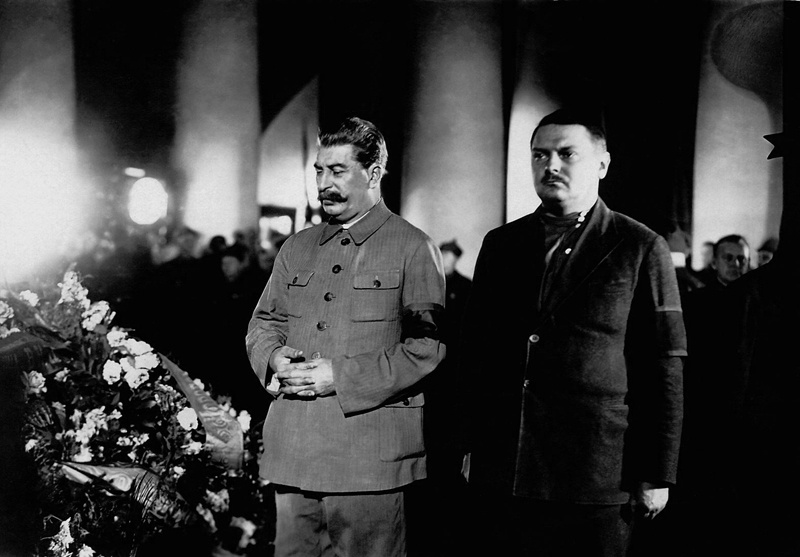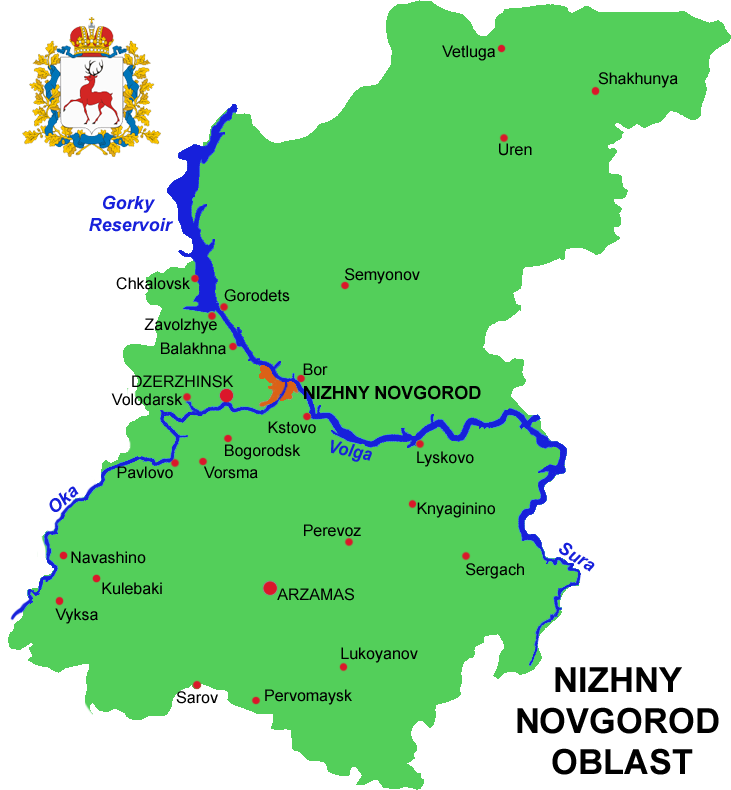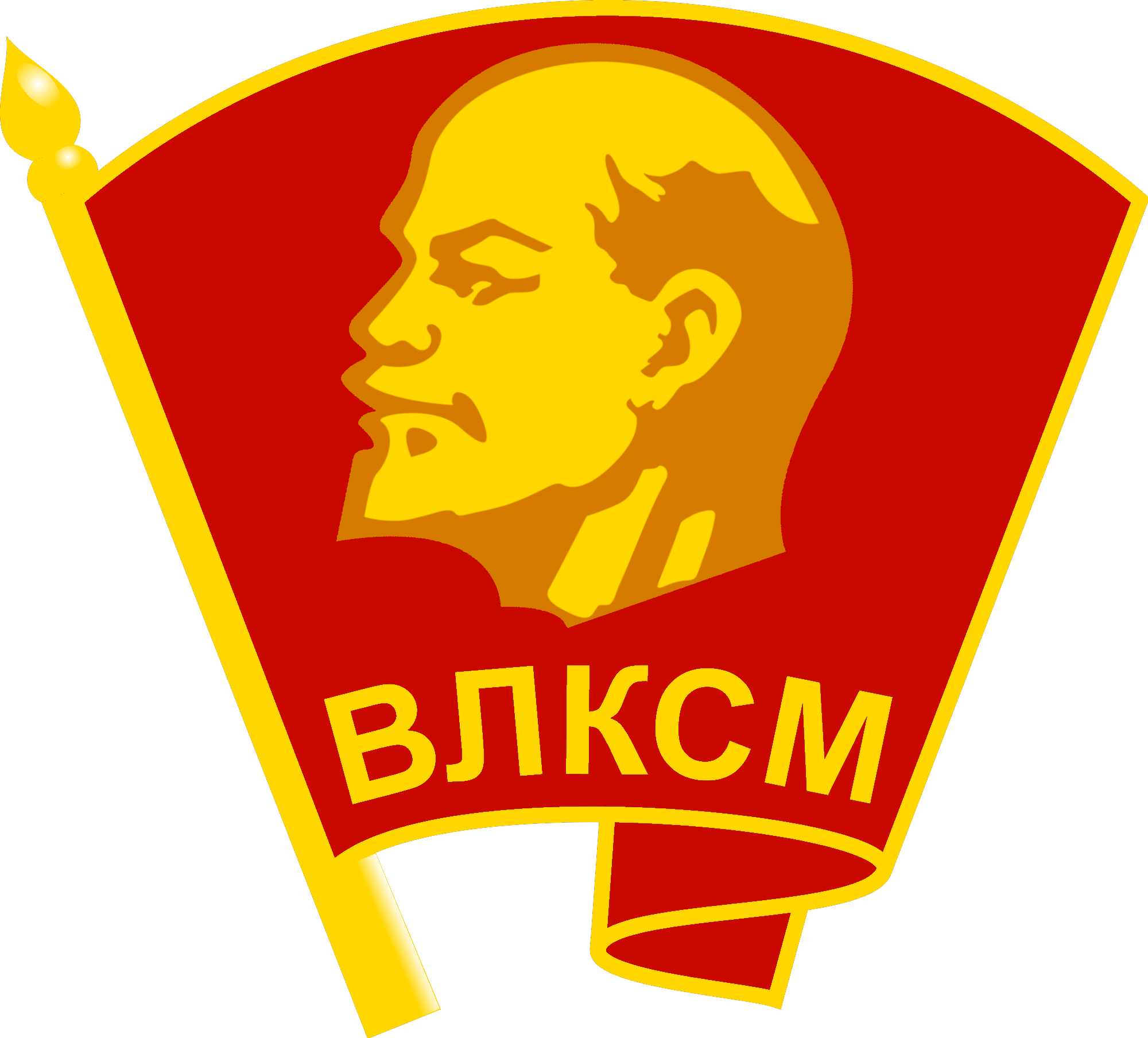|
Aleksandr Shcherbakov (20th-century Politician)
Aleksandr Sergeyevich Shcherbakov (russian: Алекса́ндр Серге́евич Щербако́в; – 10 May 1945) was a Soviet politician and statesman who was a wartime head of the Political Directorate of the Red Army as well as the director of the Soviet Information Bureau. Career Shcherbakov was born into a working-class family in Ruza, Ruzsky District, Moscow Oblast, Ruza, near Moscow. The family moved to Rybinsk after his father's death in 1907. After primary school, he was sent to work as an apprentice, at the age of 12, in a Rybinsk print works. He was sent to work in a factory at the age of 10. He joined the Red Guards in 1917, and joined the Communist Party in 1918. He worked for Komsomol in Rybinsk during the Russian Civil War. In 1921–24, he studied at Sverdlov University, Moscow. In 1924, he started work as a party official in Nizhny Novgorod, where he gained the trust of the provincial party boss, Andrei Zhdanov. In 1930–32, he studied at the Institu ... [...More Info...] [...Related Items...] OR: [Wikipedia] [Google] [Baidu] |
Ruza, Ruzsky District, Moscow Oblast
Ruza (russian: Ру́за) is a town and the administrative center of Ruzsky District in Moscow Oblast, Russia, located on the Ruza River (a tributary of the Moskva River) west of Moscow. Population: History It was first mentioned in 1339 as a part of the Principality of Zvenigorod. It became a part of the Grand Duchy of Moscow in the early 16th century. The town was a fortress which protected Moscow from the west. During World War II, Ruza was occupied by the Germans from October 25, 1941 to January 17, 1942. Administrative and municipal status Within the framework of administrative divisions, Ruza serves as the administrative center of Ruzsky District.Resolution #123-PG As an administrative division, it is incorporated within Ruzsky District as the Town A town is a human settlement. Towns are generally larger than villages and smaller than cities, though the criteria to distinguish between them vary considerably in different parts of the world. Origin and use The ... [...More Info...] [...Related Items...] OR: [Wikipedia] [Google] [Baidu] |
Institute Of Red Professors
An institute is an organisational body created for a certain purpose. They are often research organisations (research institutes) created to do research on specific topics, or can also be a professional body. In some countries, institutes can be part of a university or other institutions of higher education, either as a group of departments or an autonomous educational institution without a traditional university status such as a "university institute" (see Institute of Technology). In some countries, such as South Korea and India, private schools are sometimes referred to as institutes, and in Spain, secondary schools are referred to as institutes. Historically, in some countries institutes were educational units imparting vocational training and often incorporating libraries, also known as mechanics' institutes. The word "institute" comes from a Latin word ''institutum'' meaning "facility" or "habit"; from ''instituere'' meaning "build", "create", "raise" or "educate". ... [...More Info...] [...Related Items...] OR: [Wikipedia] [Google] [Baidu] |
Great Purge
The Great Purge or the Great Terror (russian: Большой террор), also known as the Year of '37 (russian: 37-й год, translit=Tridtsat sedmoi god, label=none) and the Yezhovshchina ('period of Nikolay Yezhov, Yezhov'), was General Secretary of the Communist Party of the Soviet Union, Soviet General Secretary Joseph Stalin's campaign to solidify his power over the party and the state; the Purge, purges were also designed to remove the remaining influence of Leon Trotsky as well as other prominent political rivals within the party. It occurred from August 1936 to March 1938. Following the Death and state funeral of Vladimir Lenin, death of Vladimir Lenin in 1924 a power vacuum opened in the Communist Party of the Soviet Union, Communist Party. Various established figures in Lenin's government attempted to succeed him. Joseph Stalin, the party's General Secretary, outmaneuvered political opponents and ultimately gained control of the Communist Party by 1928. Initially ... [...More Info...] [...Related Items...] OR: [Wikipedia] [Google] [Baidu] |
Maxim Gorky
Alexei Maximovich Peshkov (russian: link=no, Алексе́й Макси́мович Пешко́в; – 18 June 1936), popularly known as Maxim Gorky (russian: Макси́м Го́рький, link=no), was a Russian writer and socialist political thinker and proponent. He was nominated five times for the Nobel Prize in Literature. Before his success as an author, he travelled widely across the Russian Empire changing jobs frequently, experiences which would later influence his writing. Gorky's most famous works are his early short stories, written in the 1890s (" Chelkash", " Old Izergil", and " Twenty-Six Men and a Girl"); plays '' The Philistines'' (1901), '' The Lower Depths'' (1902) and '' Children of the Sun'' (1905); a poem, " The Song of the Stormy Petrel" (1901); his autobiographical trilogy, '' My Childhood, In the World, My Universities'' (1913–1923); and a novel, ''Mother'' (1906). Gorky himself judged some of these works as failures, and ''Mother'' has ... [...More Info...] [...Related Items...] OR: [Wikipedia] [Google] [Baidu] |
Union Of Soviet Writers
The Union of Soviet Writers, USSR Union of Writers, or Soviet Union of Writers (russian: Союз писателей СССР, translit=Soyuz Sovetstikh Pisatelei) was a creative union of professional writers in the Soviet Union. It was founded in 1934 on the initiative of the Central Committee of the Communist Party (1932) after disbanding a number of other writers' organizations, including Proletkult and the Russian Association of Proletarian Writers. The aim of the Union was to achieve party and state control in the field of literature. For professional writers, membership of the Union became effectively obligatory, and non-members had much more limited opportunities for publication. The result was that exclusion from the Union meant a virtual ban on publication. However, the history of the Union of Writers also saw cases of voluntary self-exclusion from its cadre. Thus, Vasily Aksenov, Semyon Lipkin, and Inna Lisnyanskaya left the Union of Writers in a show of solidarity aft ... [...More Info...] [...Related Items...] OR: [Wikipedia] [Google] [Baidu] |
Central Committee Of The Communist Party Of The Soviet Union
The Central Committee of the Communist Party of the Soviet Union, – TsK KPSS was the executive leadership of the Communist Party of the Soviet Union, acting between sessions of Congress. According to party statutes, the committee directed all party and governmental activities. Its members were elected by the Party Congress. During Vladimir Lenin's leadership of the Communist Party, the Central Committee functioned as the highest party authority between Congresses. However, in the following decades the ''de facto'' most powerful decision-making body would oscillate back and forth between the Central Committee and the Political Bureau or Politburo (and during Joseph Stalin, the Secretariat). Some committee delegates objected to the re-establishment of the Politburo in 1919, and in response, the Politburo became organizationally responsible to the Central Committee. Subsequently, the Central Committee members could participate in Politburo sessions with a consultative voic ... [...More Info...] [...Related Items...] OR: [Wikipedia] [Google] [Baidu] |
Andrei Zhdanov
Andrei Aleksandrovich Zhdanov ( rus, Андре́й Алекса́ндрович Жда́нов, p=ɐnˈdrej ɐlʲɪˈksandrəvʲɪtɕ ˈʐdanəf, links=yes; – 31 August 1948) was a Soviet politician and cultural ideologist. After World War II, Zhdanov was thought to be the successor-in-waiting to Joseph Stalin but died before him. He has been described as the "propagandist-in-chief" of the Soviet Union from 1945 to 1948.V. M. Zubok and Konstantin Pleshakov. Inside the Kremlin's Cold War: from Stalin to Khrushchev. Harvard: Harvard UP, 1996, p.119 Early life Zhdanov was born in Mariupol (now Ukraine), where his father was a school inspector. His maternal grandfather was the former rector of the Moscow Theological Academy. He studied at the Moscow Commercial Institute. In 1914, he was drafted into the Russian army, graduated from an officers' school and served in the reserves. He joined the Bolsheviks in 1915. In 1917, he was chairman of the Shadrinsk committee of the Bols ... [...More Info...] [...Related Items...] OR: [Wikipedia] [Google] [Baidu] |
Nizhny Novgorod Oblast
Nizhny Novgorod Oblast (russian: link=no, Нижегородская область, ''Nizhegorodskaya oblast''), is a federal subjects of Russia, federal subject of Russia (an oblast). Its administrative center is the types of inhabited localities in Russia, city of Nizhny Novgorod. It has a population of 3,310,597 as of the Russian Census (2010), 2010 Census. From 1932 to 1990 it was known as Gorky Oblast. The oblast is crossed by the Volga River. Apart from Nizhny Novgorod's metropolitan area (including Dzerzhinsk, Russia, Dzerzhinsk, Bor, Nizhny Novgorod Oblast, Bor and Kstovo) the biggest city is Arzamas. Near the town of Sarov there is the Serafimo-Diveyevsky Monastery, one of the largest convents in Russia, established by Seraphim of Sarov, Saint Seraphim of Sarov. The Makaryev Monastery opposite of the town of Lyskovo, Nizhny Novgorod Oblast, Lyskovo used to be the location of the largest fair in Eastern Europe. Other historic towns include Gorodets, Nizhny Novgorod Oblast ... [...More Info...] [...Related Items...] OR: [Wikipedia] [Google] [Baidu] |
Russian Civil War
, date = October Revolution, 7 November 1917 – Yakut revolt, 16 June 1923{{Efn, The main phase ended on 25 October 1922. Revolt against the Bolsheviks continued Basmachi movement, in Central Asia and Tungus Republic, the Far East through the 1920s and 1930s.{{cite book, last=Mawdsley, first=Evan, title=The Russian Civil War, location=New York, publisher=Pegasus Books, year=2007, isbn=9781681770093, url=https://archive.org/details/russiancivilwar00evan, url-access=registration{{rp, 3,230(5 years, 7 months and 9 days) {{Collapsible list , bullets = yes , title = Peace treaties , Treaty of Brest-LitovskSigned 3 March 1918({{Age in years, months, weeks and days, month1=11, day1=7, year1=1917, month2=3, day2=3, year2=1918) , Treaty of Tartu (Russian–Estonian)Signed 2 February 1920({{Age in years, months, weeks and days, month1=11, day1=7, year1=1917, month2=2, day2=2, year2=1920) , Soviet–Lithuanian Peace TreatySigned 12 July 1920({{Age in years, months, weeks and da ... [...More Info...] [...Related Items...] OR: [Wikipedia] [Google] [Baidu] |
Komsomol
The All-Union Leninist Young Communist League (russian: link=no, Всесоюзный ленинский коммунистический союз молодёжи (ВЛКСМ), ), usually known as Komsomol (; russian: Комсомол, links=no ()), a syllabic abbreviation of the Russian ), was a political youth organization in the Soviet Union. It is sometimes described as the youth division of the Communist Party of the Soviet Union (CPSU), although it was officially independent and referred to as "the helper and the reserve of the CPSU". The Komsomol in its earliest form was established in urban areas in 1918. During the early years, it was a Russian organization, known as the Russian Young Communist League, or RKSM. During 1922, with the unification of the USSR, it was reformed into an all-union agency, the youth division of the All-Union Communist Party. It was the final stage of three youth organizations with members up to age 28, graduated at 14 from the Young Pioneer ... [...More Info...] [...Related Items...] OR: [Wikipedia] [Google] [Baidu] |
Red Guards
Red Guards () were a mass student-led paramilitary social movement mobilized and guided by Chairman Mao Zedong in 1966 through 1967, during the first phase of the Cultural Revolution, which he had instituted.Teiwes According to a Red Guard leader, the movement's aims were as follows: Despite being met with resistance early on, the Red Guards received personal support from Mao, and the movement rapidly grew. The movement in Beijing culminated during the "Red August" of 1966, which later spread to other areas in mainland China. Mao made use of the group as propaganda and to accomplish goals such as seizing power and destroying symbols of China's pre-communist past ("Four Olds"), including ancient artifacts and gravesites of notable Chinese figures. Moreover, the government was very permissive of the Red Guards, and even allowed the Red Guards to inflict bodily harm on people viewed as dissidents. The movement quickly grew out of control, frequently coming into conflict with aut ... [...More Info...] [...Related Items...] OR: [Wikipedia] [Google] [Baidu] |
Rybinsk
Rybinsk ( rus, Рыбинск, p=ˈrɨbʲɪnsk), the second largest types of inhabited localities in Russia, city of Yaroslavl Oblast in Russia, lies at the confluence of the Volga River, Volga and Sheksna Rivers, 267 kilometers north-north-east of Moscow. Population: It was previously known as ''Ust-Sheksna'' (until 1504), ''Rybnaya Sloboda'' (until 1777), ''Shcherbakov'' (1946–1957), and ''Andropov'' (1984–1989). History Early history Rybinsk is one of the oldest Slavic settlements on the Volga River. The place was first recorded by chroniclers in 1071 as Ust-Sheksna, i.e. "the mouth of the Sheksna". During this period the settlement was a regional center for craft and metal based produce and for trade. In the mid-13th century, Ust-Sheksna was laid waste by Mongol invasion of Rus', invading Mongols. For the next few centuries, the settlement was referred to alternatively as Ust-Sheksna or Rybansk. From 1504, it was identified in documents as Rybnaya Sloboda (literally ... [...More Info...] [...Related Items...] OR: [Wikipedia] [Google] [Baidu] |








